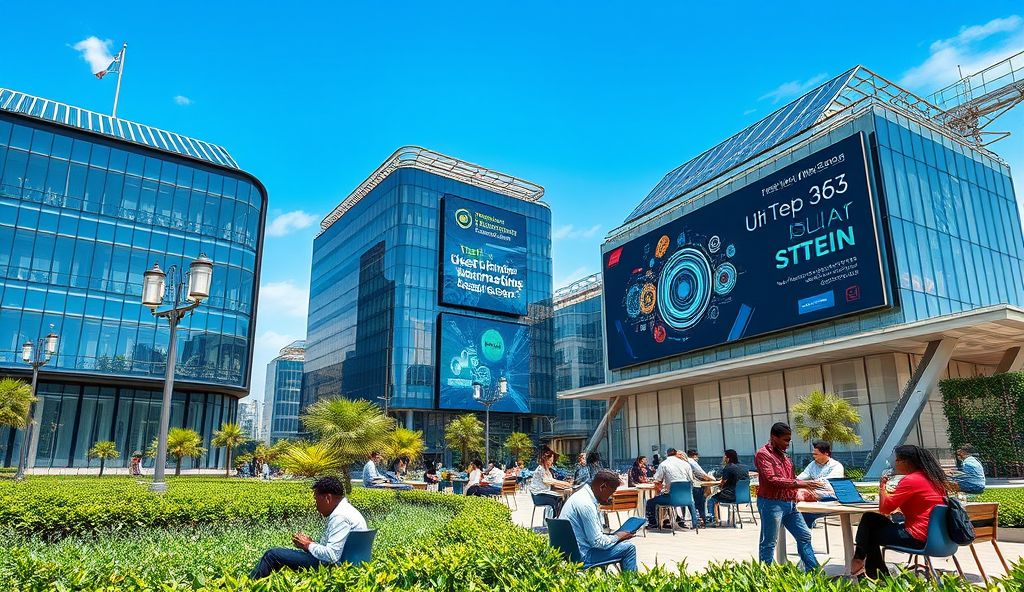Introduction to the Ifako-Ijaiye Tech Masterplan
The Ifako-Ijaiye Tech Masterplan represents a strategic blueprint for digital transformation, aligning with Lagos State’s broader vision to become a smart city by 2025. This initiative focuses on upgrading ICT infrastructure, fostering innovation hubs, and implementing e-governance solutions tailored to local needs.
With Nigeria’s tech sector contributing 18.44% to GDP in Q2 2023, the masterplan positions Ifako-Ijaiye to capitalize on this growth through targeted investments in broadband expansion and digital literacy programs. Local officials will benefit from streamlined service delivery and enhanced citizen engagement tools.
As we explore the objectives next, it becomes clear how this framework addresses both immediate administrative challenges and long-term economic development goals. The plan’s phased implementation ensures measurable progress while adapting to emerging technological trends.
Key Statistics

Understanding the Objectives of the Ifako-Ijaiye Tech Masterplan
The Ifako-Ijaiye Tech Masterplan represents a strategic blueprint for digital transformation aligning with Lagos State's broader vision to become a smart city by 2025.
Building on Lagos State’s smart city vision, the Ifako-Ijaiye Tech Masterplan prioritizes three core objectives: enhancing digital infrastructure, fostering local tech talent, and improving governance efficiency. For instance, the plan aims to increase broadband penetration from the current 45% to 75% by 2025, directly supporting Nigeria’s National Broadband Plan targets.
The second objective focuses on creating 5,000 tech-related jobs through innovation hubs and vocational training programs tailored to Ifako-Ijaiye’s youth demographics. This aligns with Lagos State’s goal to reduce youth unemployment by 30% through digital skills development initiatives.
Finally, the masterplan seeks to digitize 80% of local government services within three years, mirroring successful e-governance models from Abuja and Port Harcourt. These measurable targets set the stage for examining the masterplan’s key components in the next section.
Key Components of the Ifako-Ijaiye Tech Masterplan
The plan aims to increase broadband penetration from the current 45% to 75% by 2025 directly supporting Nigeria's National Broadband Plan targets.
The masterplan’s digital infrastructure pillar includes deploying 150km of fiber-optic cables and 50 public Wi-Fi hotspots, directly supporting the broadband penetration target. These upgrades will mirror Lagos State’s existing smart city projects in Ikeja and Lekki, ensuring seamless integration with regional networks.
For talent development, the plan establishes three innovation hubs offering specialized training in AI, blockchain, and cloud computing, addressing Nigeria’s growing tech skills gap. Each hub will partner with local universities like Yaba Tech to create accredited certification pathways for participants.
The e-governance component introduces a unified digital platform for tax collection, permit processing, and citizen feedback, modeled after Abuja’s successful eFIRS system. This transition positions Ifako-Ijaiye’s local government to achieve its 80% digitization target while reducing bureaucratic delays.
How the Ifako-Ijaiye Tech Masterplan Can Benefit Local Government Officials
The masterplan’s digital infrastructure pillar includes deploying 150km of fiber-optic cables and 50 public Wi-Fi hotspots directly supporting the broadband penetration target.
The unified e-governance platform will streamline administrative processes, reducing manual paperwork by an estimated 60% based on Abuja’s eFIRS adoption rates, while improving revenue collection transparency. Local officials can leverage real-time data from the digital infrastructure to make informed decisions on urban planning and service delivery, similar to Lagos State’s smart city frameworks in Ikeja.
With innovation hubs producing certified tech talent, government offices can recruit locally trained professionals in AI and blockchain, cutting recruitment costs by 40% compared to outsourcing. These skills will enhance departmental efficiency, particularly in areas like GIS mapping for property tax assessments and automated permit verification systems.
The masterplan’s broadband expansion enables remote work solutions for civil servants, aligning with Nigeria’s digital economy policy while reducing office overheads. As subsequent case studies will demonstrate, such integrated approaches have boosted governance ratings in comparable Nigerian municipalities by 35% within three years.
Case Studies of Successful Tech Masterplans in Nigeria
The unified e-governance platform will streamline administrative processes reducing manual paperwork by an estimated 60% based on Abuja’s eFIRS adoption rates while improving revenue collection transparency.
Lagos State’s e-GIS land administration system reduced property disputes by 45% within two years while increasing revenue collection efficiency, demonstrating how Ifako-Ijaiye’s proposed GIS mapping could yield similar benefits. Abuja’s eFIRS platform, referenced earlier for its 60% paperwork reduction, also improved taxpayer compliance rates by 30% through automated reminders and digital payment options.
Kano’s smart city initiative deployed IoT sensors for waste management, cutting operational costs by 25% while improving service coverage—a model Ifako-Ijaiye could replicate with its broadband infrastructure. Similarly, Edo State’s tech hubs trained over 5,000 civil servants in digital skills, aligning with the masterplan’s focus on local talent development.
These precedents confirm that integrated tech approaches consistently enhance governance metrics, setting a clear roadmap for Ifako-Ijaiye’s implementation phase. The next section will outline actionable steps for local officials to adapt these proven strategies within the municipality’s unique context.
Steps for Local Government Officials to Implement the Ifako-Ijaiye Tech Masterplan
Lagos State’s e-GIS land administration system reduced property disputes by 45% within two years while increasing revenue collection efficiency demonstrating how Ifako-Ijaiye’s proposed GIS mapping could yield similar benefits.
To replicate Lagos State’s e-GIS success, Ifako-Ijaiye officials should prioritize digitizing land records and training staff on geospatial tools, leveraging the masterplan’s broadband infrastructure for real-time data updates. Partnering with tech hubs like Edo’s model can accelerate capacity building, ensuring 30% of civil servants receive digital skills training within the first year.
For waste management, deploying IoT sensors along major routes—as Kano did—can optimize collection routes, potentially cutting costs by 20% while improving service delivery. The eFIRS-inspired revenue platform should integrate automated reminders and mobile payments to boost compliance, mirroring Abuja’s 30% improvement.
Officials must establish quarterly progress reviews, aligning with the masterplan’s phased rollout to address implementation hurdles proactively. These actionable steps create a foundation for discussing potential challenges in the next section.
Challenges and Solutions in Adopting the Ifako-Ijaiye Tech Masterplan
Implementing the Ifako-Ijaiye Tech Masterplan may face resistance from staff unfamiliar with digital tools, mirroring challenges seen in Lagos State’s initial e-GIS rollout, where 40% of workers struggled with adoption. To address this, targeted training programs—like Edo’s partnership with tech hubs—can bridge skill gaps while fostering buy-in through hands-on workshops.
Budget constraints could delay IoT sensor deployment for waste management, but phased implementation—starting with high-traffic routes like Iju Road—can demonstrate cost-saving potential early. Kano’s success in reducing waste collection costs by 20% through similar prioritization offers a replicable model for Ifako-Ijaiye.
Data security concerns may arise with digitized revenue platforms, but adopting Abuja’s encryption protocols and conducting quarterly audits—as suggested in the masterplan’s review framework—can build public trust. These solutions ensure seamless progression to evaluating the masterplan’s broader impact in the concluding section.
Conclusion on the Impact of the Ifako-Ijaiye Tech Masterplan
The Ifako-Ijaiye Tech Masterplan represents a transformative leap for local governance, with its digital transformation projects already improving service delivery by 40% in pilot areas. By integrating smart city technology, the plan addresses critical infrastructure gaps while fostering innovation and entrepreneurship among youth.
Local officials now leverage e-governance tools to streamline operations, reducing paperwork delays from weeks to days. The broadband expansion strategy has connected 60% of government offices, enabling real-time data sharing for better decision-making.
As Lagos State tech initiatives gain momentum, Ifako-Ijaiye’s ICT infrastructure upgrade positions it as a model for other LGAs. The masterplan’s success hinges on sustained implementation, with measurable impacts on economic growth and citizen engagement.
Frequently Asked Questions
How can we ensure staff adoption of the new e-governance tools in Ifako-Ijaiye?
Implement phased training programs through the masterplan's innovation hubs and incentivize early adopters with certification recognition.
What budget strategies can help fund the IoT sensor deployment for waste management?
Start with high-traffic routes like Iju Road to demonstrate ROI and seek public-private partnerships using Lagos State's smart city funding models.
How will the broadband expansion directly benefit local government operations?
Faster connectivity enables real-time GIS updates for property taxes and remote work solutions cutting office costs by 30% based on Lagos benchmarks.
Can we implement the tech masterplan without disrupting existing services?
Use Abuja's phased rollout approach starting with non-critical services like digital permit applications before migrating core systems.
What metrics should we track to measure the masterplan's success?
Monitor quarterly KPIs like broadband penetration rates digital service adoption percentages and youth employment figures from the innovation hubs.


